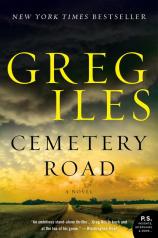Cemetery Road
Review
Cemetery Road
Greg Iles does not like short books. In fact, the last several he penned are all weighty tomes. You can add his latest, CEMETERY ROAD, to that list, weighing in at nearly 600 pages. The one thing you know you're going to get from an Iles novel is fantastic writing matched with fully realized characters so real you can almost hear them breathing off of each page.
I have referred to Iles' recent work as being southern gothic noir, a genre made famous by such literary giants as Harper Lee and Robert Penn Warren, and contemporary authors like John Grisham, who has set many of his novels in the South and calls Iles his “Mississippi brother.” Ironically, the protagonist in CEMETERY ROAD, the extremely passionate newspaper writer Marshall McEwan, makes reference to the drama in the small town of Bienville, Mississippi, likening it to MIDNIGHT IN THE GARDEN OF GOOD AND EVIL by John Berendt, a literary juggernaut that also spawned a decent film adaptation.
I could not get around the main character's name without thinking of Marshall McLuhan, who was one of the leading authorities on media and mass communications, and was the author of THE MEDIUM IS THE MASSAGE. In a way, McEwan and McLuhan both represent the written conscience and the “message” being something that needs to be massaged to suit the masses. The major difference is that while McLuhan made reference to the emerging global village that the media now addressed, McEwan is concerned with how to address his own colloquial village --- a southern town with a lot of prejudices and secrets. He understands he is on thin ice when writing about a controversial murder case in the town in which he grew up, as there are many powerful residents who have much to lose if the truth was to actually get out.
"There is so much action and character development here that it is impossible to turn away. It's like binge-watching your favorite TV drama, and you don’t dare take your eyes off the screen for fear of missing out on another revelation."
There is a lot of history between all the characters in CEMETERY ROAD, as well as the anticipated familial guilt. In particular, Marshall's father, Duncan, who is deathly ill, has never forgiven him for the drowning death of his older brother, Adam, when they were children --- even though Marshall was not directly responsible for this tragedy. To show how deep the divide is between father and son, Marshall's only child is a young boy he named Adam. Duncan refuses to ever meet his grandson and is not happy with the name selection. In a morose bit of irony, Marshall's son dies tragically without ever meeting his grandfather.
Family is not the only problem Marshall has to deal with. For generations since the day Lee surrendered to the Yankees at Appomattox, Bienville has been unofficially run by a cadre of individuals calling themselves the Poker Club. Specifically, Marshall holds them responsible for the murder of his friend and mentor, Buck Ferris. Buck was a well-known archaeologist who was doing some digging on a site that had been set aside for a new factory owned by a well-known Chinese company. Of course, a lot of politics and the Poker Club were involved in this deal, which would make many people in Bienville very wealthy. The intrusion of Buck could have threatened this new business land acquisition, which would explain why he was killed and dumped in the river.
Marshall plans to use the local paper, the one started by his father, to avenge Buck's death and bring down the Poker Club. He doesn't realize that most of the town supports this new Chinese company opening as it will create jobs and revenue for all. The only person Marshall can confide in is the owner of the local independent bookstore, Nadine Sullivan. She still has Marshall come in through the back door of her establishment as her regular patrons would stop coming if they knew he was allowed in. Nadine, eight years Marshall's junior, also carries quite a torch for him.
Another difficulty is Marshall's old girlfriend, an attorney named Jet, who is eager to rekindle things upon his return. The problem is that she is married to Paul Matheson, the son of current Poker Club member Max Matheson. Paul not only has been friends with Marshall since they were kids, he also saved his life in the Middle East when both were serving. He would not be happy to learn that Marshall and Jet were stepping out on him. Making matters even more concerning, Paul and Jet's only child, teenager Kevin, may or may not be Paul's. I will not reveal the person suspected of being the actual father; instead, I will just allow your imagination to run with that thought.
There is so much action and character development here that it is impossible to turn away. It's like binge-watching your favorite TV drama, and you don’t dare take your eyes off the screen for fear of missing out on another revelation. CEMETERY ROAD is full of them. The actual Cemetery Road has symbolic meaning as well, which readers will find out shortly into this masterful work. The inevitable showdown between Marshall and the Poker Club, plus Marshall and Paul, as well as the deathbed reconnection of Marshall and Duncan, will have readers riveted. Quite frankly, I didn't want this tale to end.
CEMETERY ROAD is like an episode of “Dallas” set in small-town Mississippi with the Mathesons taking on the role of the Ewings. I have been a Greg Iles fan since the start, but have noticed a marked difference in his writing since his car accident that nearly cost him his life and did cost him most of his right leg. This reminds me of Dean Koontz, whose writing style changed significantly after he suffered a near-death experience. Iles' work has gotten not only lengthier but also far more personal. You can smell the Mississippi magnolias in every description he provides for Bienville, as he puts readers right there along with him on his trip down memory lane.
Reviewed by Ray Palen on March 8, 2019




